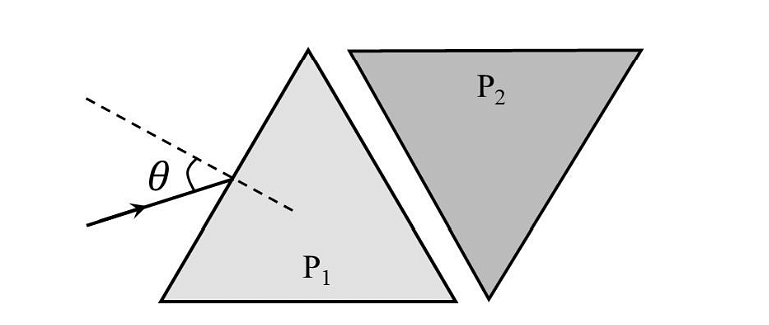Let f : (0,1) → R be the function defined as f(x) = √n if x ∈ [\(\frac{1}{n+1},\frac{1}{n}\)] where n ∈ N. Let g : (0,1) → R be a function such that \(\int_{x^2}^{x}\sqrt{\frac{1-t}{t}}dt<g(x)<2\sqrt x\) for all x ∈ (0,1).
Then \(\lim_{x\rightarrow0}f(x)g(x)\)
Let f : (0,1) → R be the function defined as f(x) = √n if x ∈ [\(\frac{1}{n+1},\frac{1}{n}\)] where n ∈ N. Let g : (0,1) → R be a function such that \(\int_{x^2}^{x}\sqrt{\frac{1-t}{t}}dt<g(x)<2\sqrt x\) for all x ∈ (0,1).
Then \(\lim_{x\rightarrow0}f(x)g(x)\)
- does NOT exist
- is equal to 1
- is equal to 2
- is equal to 3
The Correct Option is C
Approach Solution - 1
\(f(x)=\sqrt{\frac{1}{x}-1}\)
\(\lim_{x\rightarrow 0^+}\int_{x^2}^{x}\sqrt{\frac{1-t}{t}}dt\sqrt{\frac{1}{x}-1}\times2\sqrt x\)
\(=\lim_{x\rightarrow 0^+}2\sqrt{x(\frac{1}{x}-{\frac{1}{x}})}=2\)
\(\lim_{x\rightarrow 0^+}2\sqrt {x(\frac{1}{x})}=2;(\frac{1}{x}\notin Z)\)
\(\lim_{x\rightarrow0^+}\int_{x^2}^{x}\sqrt{\frac{1-t}{t}}dt.\sqrt{\frac{1}{x}-\frac{1}{x}}=\int_{x^2}^{x}\frac{1-t}{t}dt\sqrt{1-x}(\frac{1}{x})\)
\(\lim_{x\rightarrow}2\sqrt{1-x}.4\sqrt{x}.\sqrt{1-x^2}=2\)
similarly for \(\frac{1}{x}\in Z \) is equal to 2.
Approach Solution -2
We need to solve a one-sided limit to find the answer, otherwise \(\lim\limits_{x→0^-}\) doesn't exist because it is not in the domain.
\(f(x)=\sqrt{(\frac{1}{x})-1}\) where (.) = least integer function
\(\lim\limits_{x→0^+}\int\limits_{x^2}^x\sqrt{\frac{1-t}{t}}dt.\sqrt{(\frac{1}{x})-1}\le \lim\limits_{x→0^+}f(x).g(x)\le\lim\limits_{x→o^+}\sqrt{(\frac{1}{x}-1)}\times2\sqrt{x}\)
So, \(\lim\limits_{x→0^+}\sqrt{(\frac{1}{x})-1}\times2\sqrt{x}=\lim\limits_{x→0^+}2\sqrt{x}\sqrt{[\frac{1}{x}]}\ \ (\frac{1}{x}∉ Z)\)
\(=\lim\limits_{x→0^+}2\sqrt{x\left(\frac{1}{x}-\left\{\frac{1}{x}\right\}\right)}=2\)
\(=\lim\limits_{x→0^+}2\sqrt{x(\frac{1}{2})}=2;(\frac{1}{x}∉Z)\)
\(\lim\limits_{x→0^+}\int\limits_{x^2}^{x}\sqrt{\frac{1-t}{t}}dt.\sqrt{\frac{1}{x}-\left\{\frac{1}{x}\right\}}=\frac{\int\limits_{x^2}^x\sqrt{\frac{1-t}{t}}dt.\sqrt{1-x\left\{\frac{1}{x}\right\}}}{\sqrt{x}}\)
\(\lim\limits_{x→0^+}\frac{\int\limits_{x^2}^x\sqrt{\frac{1-t}{t}dt}}{\sqrt{x}}=\lim\limits_{x→0^+}\frac{\sqrt{\frac{1-x}{x}}-2x\sqrt{\frac{1=x^2}{x^2}}}{\frac{1}{2\sqrt{x}}}\)
\(\lim\limits_{x→0^+}2\sqrt{1-x}-4\sqrt{x}.\sqrt{1-x^2}=2\)
In the same way, \(\frac{1}{4}\in Z\) is equal to 2.
So, the correct option is (C) : is equal to 2.
Top Questions on Methods of Integration
- For any y∈R, let cot\(^{-1}\)(y) ∈ (0,π) and tan\(^{-1}\)(y) ∈ (\(-\frac{\pi}{2},\frac{\pi}{2}\)). Then the sum of all the solutions of the equation\(tan^{-1}(\frac{6y}{9-y^2})+cot^{-1}(\frac{9-y^2}{6y})=\frac{2\pi}{3}\, for\,0<|y|<3,\) is equal to
- JEE Advanced - 2023
- Mathematics
- Methods of Integration
∫ (x2 - 1)dx/(x3(2x4 - 2x2 1)1/2) = ?
- MHT CET - 2023
- Mathematics
- Methods of Integration
- If $\phi(x)=\frac{1}{\sqrt{ x }} \int_{\frac{\pi}{4}}^x\left(4 \sqrt{2} \sin t-3 \phi^{\prime}(t)\right) dt , x>$, then $\emptyset^{\prime}\left(\frac{\pi}{4}\right)$ is equal to :
- JEE Main - 2023
- Mathematics
- Methods of Integration
\(\int \frac{1}{(x + 2)(1 + x)^2} \, dx\)
- MHT CET - 2023
- Mathematics
- Methods of Integration
- Let S be the set of all twice differentiable functions f from R to R such that \(\frac{d^2f}{dx^2}(x)>0\) for all x∈(-1,1). For f∈S, let Xf be the number of points x∈(-1,1) for which f(x)=x.Then which of the following statements is(are) true?
- JEE Advanced - 2023
- Mathematics
- Methods of Integration
Questions Asked in JEE Advanced exam
- Let \(S=\left\{\begin{pmatrix} 0 & 1 & c \\ 1 & a & d\\ 1 & b & e \end{pmatrix}:a,b,c,d,e\in\left\{0,1\right\}\ \text{and} |A|\in \left\{-1,1\right\}\right\}\), where |A| denotes the determinant of A. Then the number of elements in S is _______.
- JEE Advanced - 2024
- Matrices
- A block of mass \(5 kg\) moves along the \(x-\)direction subject to the force \(F = (−20x + 10) N,\) with the value of \(x \) in metre. At time \(t = 0 s,\) it is at rest at position \(x = 1 m\). The position and momentum of the block at \(t = (\pi/4)\) s are
- JEE Advanced - 2024
- Work-energy theorem
- Two equilateral-triangular prisms \(P_1 \)and \(P_2\) are kept with their sides parallel to each other, in vacuum, as shown in the figure. A light ray enters prism \(P_1\) at an angle of incidence 𝜃 such that the outgoing ray undergoes minimum deviation in prism \(P_2\). If the respective refractive indices of \(P_1\) and\( P_2\) are \(√ 3 /2\) and \(√3\), then \(\theta = sin{−1}[\sqrt \frac{ 3}{ 2} sin ( \frac{\pi}{B} )],\) where the value of \(\beta\) is ______.

- JEE Advanced - 2024
- Ray optics and optical instruments
- Let \(\overrightarrow{OP}=\frac{\alpha-1}{\alpha}\hat{i}+\hat{j}+\hat{k},\overrightarrow{OQ}=\hat{i}+\frac{\beta-1}{\beta}\hat{j}+\hat{k}\) and \(\overrightarrow{OR}=\hat{i}+\hat{j}+\frac{1}{2}\hat{k}\) be three vector where α, β ∈ R - {0} and 0 denotes the origin. If \((\overrightarrow{OP}\times\overrightarrow{OQ}).\overrightarrow{OR}=0\) and the point (α, β, 2) lies on the plane 3x + 3y - z + l = 0, then the value of l is _______.
- JEE Advanced - 2024
- Vector Algebra
- Let \(\vec{p}=2\hat{i}+\hat{j}+3\hat{k}\) and \(\vec{q}=\hat{i}-\hat{j}+\hat{k}\). If for some real numbers α, β and γ we have
\(15\hat{i}+10\hat{j}+6\hat{k}=α(2\vec{p}+\vec{q})+β(\vec{p}-2\vec{q})+γ(\vec{p}\times\vec{q})\),
then the value of γ is ________.- JEE Advanced - 2024
- Vector Algebra
Concepts Used:
Methods of Integration
Given below is the list of the different methods of integration that are useful in simplifying integration problems:
Integration by Parts:
If f(x) and g(x) are two functions and their product is to be integrated, then the formula to integrate f(x).g(x) using by parts method is:
∫f(x).g(x) dx = f(x) ∫g(x) dx − ∫(f′(x) [ ∫g(x) dx)]dx + C
Here f(x) is the first function and g(x) is the second function.
Method of Integration Using Partial Fractions:
The formula to integrate rational functions of the form f(x)/g(x) is:
∫[f(x)/g(x)]dx = ∫[p(x)/q(x)]dx + ∫[r(x)/s(x)]dx
where
f(x)/g(x) = p(x)/q(x) + r(x)/s(x) and
g(x) = q(x).s(x)
Integration by Substitution Method
Hence the formula for integration using the substitution method becomes:
∫g(f(x)) dx = ∫g(u)/h(u) du
Integration by Decomposition
Reverse Chain Rule
This method of integration is used when the integration is of the form ∫g'(f(x)) f'(x) dx. In this case, the integral is given by,
∫g'(f(x)) f'(x) dx = g(f(x)) + C



